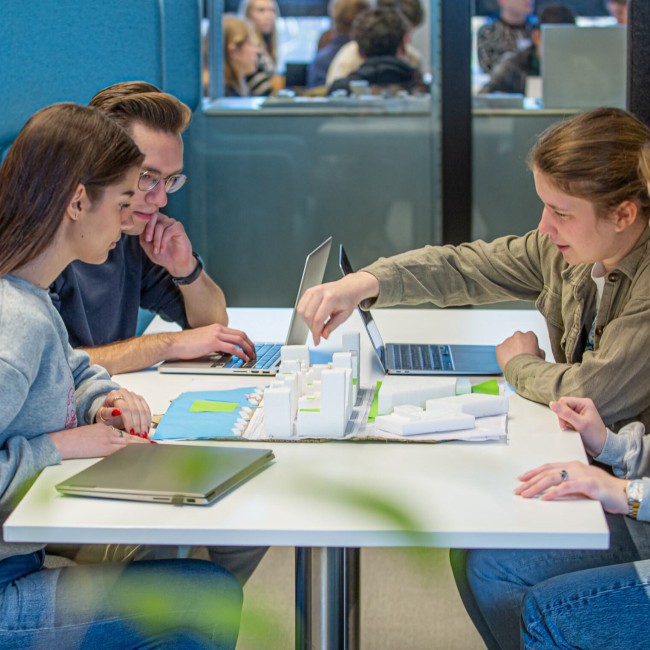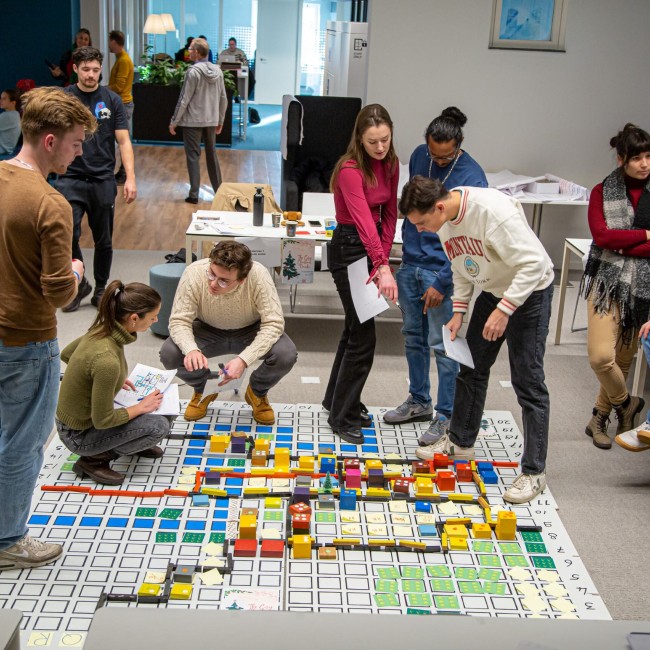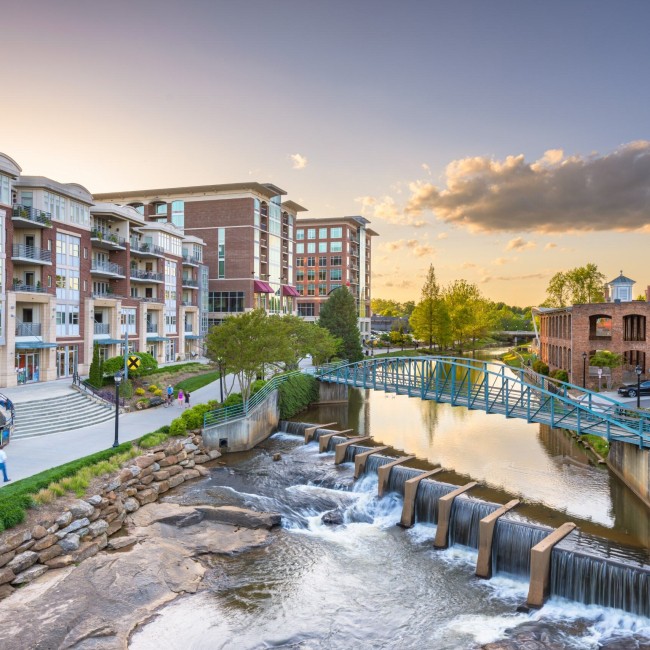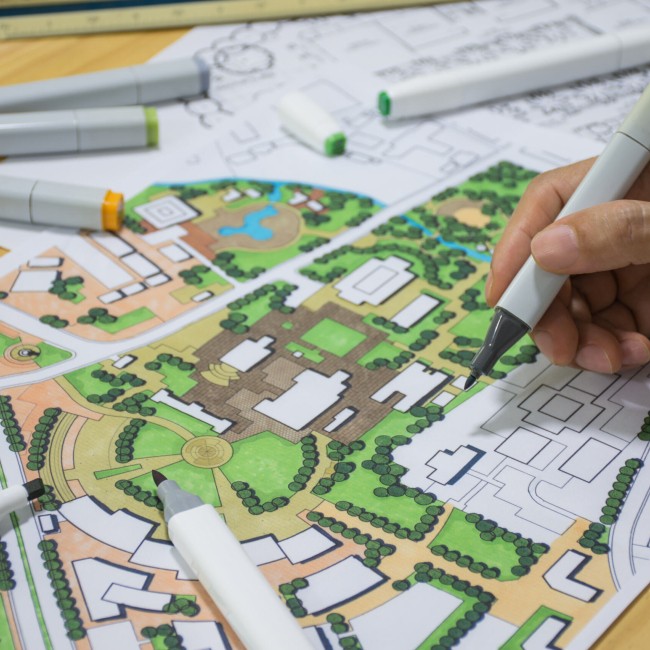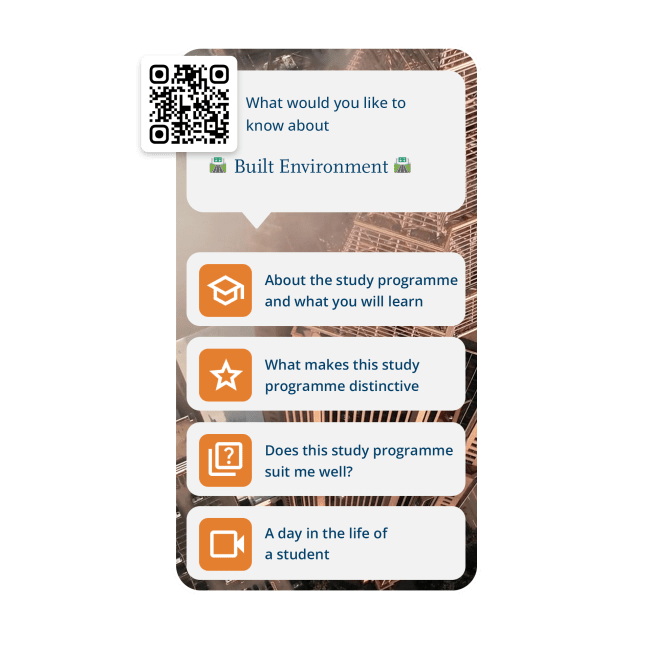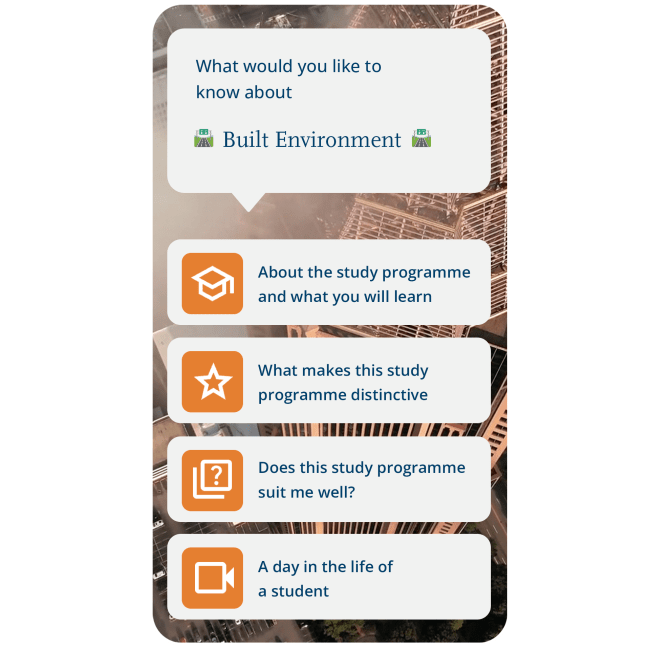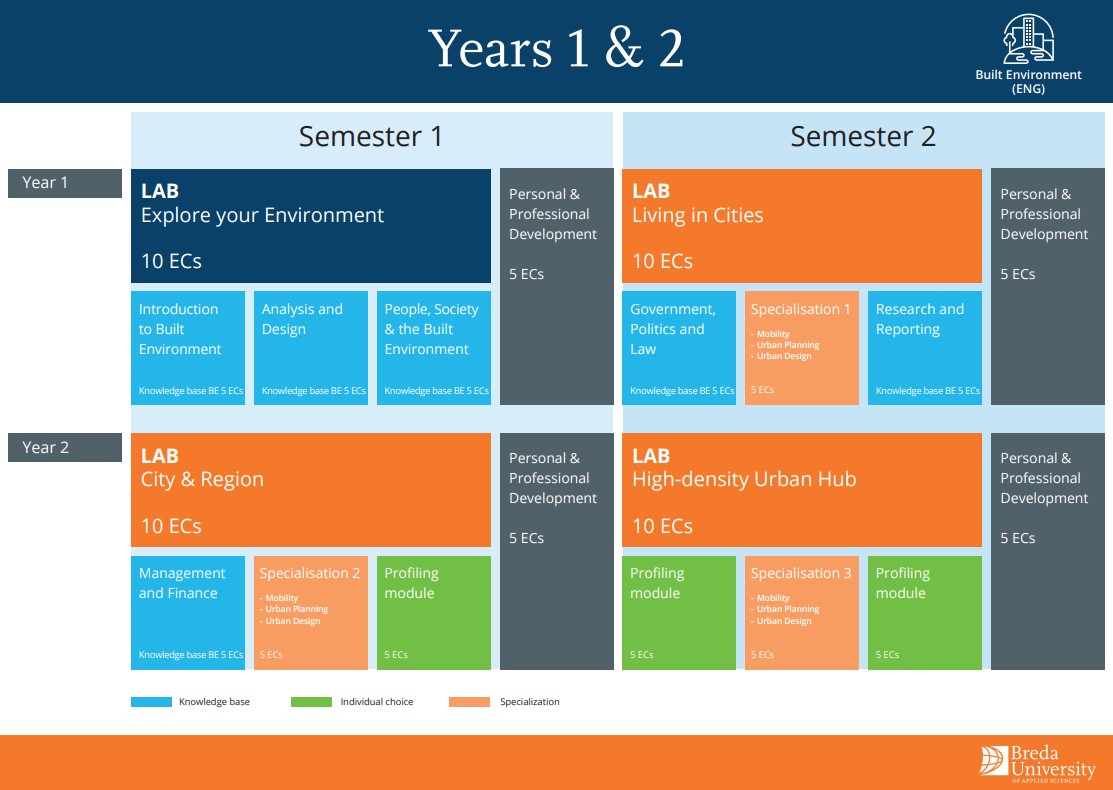Come and meet us
Walking around on campus is the best way to truly experience BUas. Sign up for one of the upcoming events or activities.
Discover the Built Environment programme
Discover the Built Environment programme in an interactive story. Swipe through the shorts, see what you can become later and take the quiz to see if this study suits you!
Study overview
Year 1
In the first year, you will be introduced to all aspects of the Built Environment discipline and work on a thorough (knowledge) base before you will further specialise. Year 1 is divided into four terms. During a term, you will attend theoretical modules, but you will also work together with other students on a spatial project or assignment.
You will be given an introduction to Built Environment, in which all important components from the subject area will be addressed with inspiring practical examples. You will learn theoretical knowledge about people and society, how cities operate, and how you can study, analyse and (re)design them.
Although this is a Dutch-taught study programme, you will explicitly take a look beyond our borders and you may attend one or several courses or guest lectures in English. In addition, part of the literature used could be in English.
After the second term you will make a choice from one of the three specialisations:
- Mobility
- Spatial Planning
- Urban Design
You can find more information about the specialisations under the tab Specialisations.
In terms 3 and 4 a lot of attention is paid to how you – from the perspective of your own specialism - play a part in projects together with other fellow students.
During the LAB projects in year 1 you will have several excursions, during which you will visit industry organisations as well as cities. They will give you a more integral picture of the field of expertise and you will see how Built Environment is applied in everyday practice – an eye-opener!
Are you curious about the structure of the study programme and the courses that a Built Environment student attends? Have a look at the student handbook.
Years 2, 3 and 4
From year 2 onwards you will broaden or deepen your knowledge in addition to your specialism and role within projects, by choosing your own modules. You can choose from various modules, join our own research projects or take an in-depth look at a certain area from your specialisation. Think of, among other things, Sustainability, Trends & Transitions or Architecture. Then you will use this knowledge and these skills in your projects to think up even smarter and better solutions.
In year 2, you will also go on an excursion abroad.
Year 3 starts with a six-month work placement at a government institution, consultancy firm or another organisation. Or you choose a research project in our own Research & Business Innovation (RBI) department. In the latter half of the year you will take part in a big project, in which you will use all the knowledge acquired to date to create your own vision and plan for the future’s (urban) living environment.
At the beginning of year 4, you will attend a minor; a deepening minor in which you will further specialise in the field of study, or you will take a look beyond the boundaries of your field of study: a broadening minor. In the latter half of the year, you will do your graduation project and a graduation assignment for an organisation.
- Placement
In the first half of year 3, you will do an 18-week work placement. You carried out several business cases/practical cases within groups in the project education in year 1 and 2. Now you are going to do so on your own. This means you will carry out (an) assignment(s) independently or contribute to (a) project(s). You will do so at consultancy firms, design agencies, government institutions, and big companies such as Arcadis, BAM, Public Works and Water Management (Rijkswaterstaat), Dutch Railways (NS), ANWB, etc.
It is also possible to take an in-depth look at one of the research projects within our Research and Business Innovation (RBI) department for six months. You are going to search for a company that matches your interests, or which you would like to work for in the future. The department will assign a lecturer or supervising lecturer who will supervise your placement.
- Graduation project
In year 4 you will commence your graduation project as from February. You will conduct your own research commissioned by a company. Upon completion of the research, it can be used for the organisation. You will search for a graduation host company and graduation assignment independently. You will work on the site during the graduation project. You will be supervised individually by a BUas supervising lecturer and by a company supervisor.
Examples of topics are:
- Research into multiple use of space at railway stations
- Satisfaction survey among users of cycle routes
- Restructuring of business parks
- Design research into urban infill development locations
You will write a thesis about this assignment, which you will defend during your final exam.
You will have a chance to go abroad for your placement and graduation project, and, in doing so, develop in terms of content and personally in another culture. Something we would encourage very much.
- Exchange
Spending time studying abroad offers you the opportunity to push your boundaries, both literally and figuratively. You expand your international network, learn another language and gain more insight into intercultural differences (and similarities!). Breda University of Applied Sciences has contacts with numerous universities all over the world where you can go as an exchange student.
- Minors
During a minor, you can choose whether you want to delve deeper into your current field of study or broaden your horizons in a different subject. You can choose to take a minor at BUas. Check out all the minors that BUas offers here. You can also choose a minor at another university of applied sciences in the Netherlands or go abroad.
If you want to take an in-depth look at the Built Environment discipline, we offer several minors. An example is the minor International Urban Redevelopment. You will take a look at solutions for sustainable mobility and growth in cities all over the globe. BUas students and lecturers went to visit Calgary, where they made a plan for restructuring a high street. If you are curious about what they did there, please read on here.
- Pre-master
We offer all students the chance to attend the academic pre-master Strategic Business Management and Marketing (SBM). This pre-master gives you direct access to Master of Science programmes in business-related studies at our university partners, such as the University of Amsterdam, Maastricht, Tilburg, Brussels (B) or Warwick (UK). After this pre-master, you also have direct access to our academic master’s programme of Leisure and Tourism Studies. In this way, you can obtain an academic master’s degree in just five years, or even in four years (if you opt for a three-year bachelor’s track)!
Teaching method
The educational programme of Built Environment is very diverse and hands-on. When doing this study programme you will learn about people and society, how cities operate, and how you can study, analyse and (re)design them. You will soon apply theoretical knowledge in learning communities, and in doing so, you cooperate a lot with fellow students, your lecturers and the industry.
You will work on joint and individual projects. You will attend workshops and guest lectures, but you will also visit businesses, for example. Each term contains a LAB (project) and several modules/business cases. In addition, you will constantly work on your personal and professional development under the guidance of your coach.
Learning community
In the learning community (called LAB) of our professional bachelor’s programme Built Environment, you will learn to think up sustainable and innovative solutions for spatial and social issues in cities and regions. You will learn how to design and manage attractive cities, you will learn how to encourage people to make smart transport choices and you will learn to think and design strategically. You work on theoretical and practical knowledge and develop your professional skills.
Dutch- versus English-taught education
This programme is available in Dutch and English. If you choose English, you will join an international class. The mix of students and lecturers from the Netherlands and abroad naturally brings more attention to intercultural differences; not only in education but also in international projects and excursions. This enhances international cooperation and atmosphere, preparing you even better for an international career.
In the Dutch-language programme, it may happen that you take projects or guest lectures in English. In addition, some of the literature used may be in English. The working language on our campus is English.
Study load and coaching
You will have 25 contact hours a week in year 1, but you should take as a starting point that you will be engaged in your studies full-time. Your study timetable will be created in such a way that you will have enough time to attend lectures, and you will have time to work on your projects and assignments outside classes.
It is a full-time study programme and your LAB projects will take quite a lot of time, but they will also be included in your study timetable. Of course, there will also be enough time for relaxation, during drinks parties and activities organised by the BELO study society. There are also various clubs at BUas that you can join.
- A typical week
In year 1 the lectures you will attend are very diverse. You will be offered theory in lectures, and you can immediately apply it to assignments to be carried out in seminars. Also, experts from the Built Environment discipline come and tell you something about their work or a certain topic in guest lectures. What’s more, you will spend a lot of time on working on a project in groups with fellow students.
A study week may look as follows (Please note: this is just an example):
Monday
- 10.00-12.00: Lecture about Introduction to Built Environment
- 12.00-13.00: Lunch
- 13.00-15.00: Working on your development with the Personal & Professional Development course
Tuesday
- 13.00-17.00: Introduction to your ‘Discover your Environment’ LAB project
Wednesday
- 11.00-12.30: Lecture on ‘People, Society & Space’
- 12.30-13.00: Lunch
- 13.00-15.00: For the Personal & Professional Development course, two alumni come and tell something about their work at a consultancy firm and a municipality.
Thursday
- 11.00-12.30: Lecture on ‘Analysis and Design’
- 12.30-13.00: Lunch
- 13.00-15.00: Working on the group assignment of ‘People, Society & Space’ together with your fellow students
- 15.00-16.00: Independent study
- 16.00-18.00: Drinks party organised by the BELO study society
Friday
- 10.00-12.00: Seminar on ‘Analysis and Design’
- 12.00-13.00: Lunch
- 13.00-17.00: Working together on the LAB assignment with your project group.
Coaching
During the first two years of your study programme you will attend the Personal & Professional Development (PPD) course. You will attend a programme consisting of workshops which will support you in your personal and professional development. You will work on various types of assignments and reflect on your development and choices (e.g. with regard to a work placement in year 3). In the PPD track, you will receive personal guidance from your study coach, during which your study progress will also be discussed.
Student well-being
BUas encourages and helps you to make the most of yourself, whatever your circumstances. Maybe you have a chronic illness, are a family carer, a competitive athlete, or juggle your studies with running your own business? Our study coaches, student counsellors and student psychologists are here to help. Do you need extra support or advice? Or extra facilities? Then take a look at the options here.
Specialisations
After the first semester in year 1, you will make a choice from one of the three specialisations:
1. Mobility
The world of mobility is in a state of flux, with innovations coming in rapid succession. Think of smart mobility, shared mobility, new vehicle technologies, the rise of cycling and walking, and the use of big data. In this specialisation, you will dive into these developments. Not only will you be introduced to these groundbreaking themes, but you will also have the opportunity to actively contribute to the future of mobility.
2. Spatial Planning
You will ensure that new plans for the city are in line with the wishes of residents, the municipality, businesses and other stakeholders. You will take into account the latest social and technological developments, and study trends in living, working and undertaking recreational activities. You will make plans that are financially feasible and comply with the law. You will supervise the entire process, from idea to implementation, thus contributing to the sustainable and future-oriented growth of cities.
3. Urban Design
In this specialisation, you will learn to make urban design plans for different types of areas, from new sustainable neighbourhoods to urban redevelopments. You will also work on designs for entire regions and rural areas. In our design workshops, you will bring your ideas to life by building models. This is how you develop the practical and creative skills you need to help build the future of cities and regions.
Field trips and excursions
As a Built Environment student you will explore your field of study during excursions at home and abroad throughout your studies. In the first year, you will visit cities (e.g. Rotterdam, Eindhoven) and organisations (e.g. Rijkswaterstaat) in the Netherlands where you will learn about the different specialisations of Built Environment.
In the second year, you will also go on an excursion abroad, exploring differences and similarities between Built Environment in the Netherlands and in a European city. The cities of Copenhagen and Barcelona are recurring excursion destinations. Also during the projects you often do field research, so you can incorporate the findings and ideas into your plan.
Study tracks after Ad, mbo, vwo, hbo or wo
- With an associate degree (BE) - 2 years
With an associate degree in Built Environment or Spatial Planning and the right specialisation area, you will qualify for admission into our bachelelor’s programme in Built Environment, both the English-taught and the Dutch-taught variants. The duration of our bachelor’s programme is 4 years, however, with an associate degree already in your pocket you can complete our bachelor’s programme faster.
After completing your associate degree, you will follow another 2 years of education (120 ECTS credits) at Breda University of Applied Sciences. After earning all your credits, you will have obtained your Bachelor of Science degree.
Want to know more?
Do you want to obtain more information about moving on to further study after your associate degree? If so, please contact the student counsellors of this programme, Minke Snels and Lizanne Hessels: [email protected].
- After a related mbo programme – 3 years
Did you complete one of these mbo programmes at level 4?
- Middenkaderfunctionaris bouw
- Middenkaderfunctionaris infra
- Middenkaderfunctionaris verkeer en stedenbouw/Urban Design
If so, you may qualify for the mbo-hbo transfer track. Based on one of these mbo programmes you can get exemptions for year 1 of the Built Environment programme (NL), upon successful completion of the track. As a result, you will be able to complete the degree programme in three years’ time.
What does the mbo-hbo transfer track entail?
When you are in the last year of your mbo programme, you can take part in the mbo-hbo transfer track. Over a 16-week period, on Wednesdays, you will take several training sessions and courses and carry out a project. If you receive a positive recommendation after having completed this track, you will be able to enter the second year of the Built Environment degree programme. The transfer track always starts around mid-February and lasts until mid-June. Please download the brochure (see below) for more information. And feel free to contact the student counsellor to discuss the possibilities ([email protected]).
Please note: Only students of the programme middenkaderfunctionaris verkeer en stedenbouw/Urban Design of Koning Willem I college in 's-Hertogenbosch will qualify for transfer into the second year of the Urban Design specialisation area.
Is it for you?
The transfer track is meant for you to find out whether education at hbo level suits you and whether you can handle education at this level. If you are going to follow this track, you will be enrolled as a course participant at Breda University of Applied Sciences. You do not yet pay any tuition fee, but you can make use of our student facilities. Just come and visit us on one of our open days, so you can get a taste of the atmosphere of studying at an hbo institute, and you will have the opportunity to talk about the transfer track with our student counsellor.
How and until when can you apply?
To apply for the mbo-hbo transfer track, please go to Studielink. You have until 29 January to apply for this track.
Want to know more?
Do you want to know more about this track? Please contact the student counsellors of this programme, Minke Snels and Lizanne Hessels: [email protected], telephone (076) 533 2600, or download the mbo-hbo transfer track brochure (in Dutch).
- After vwo – 3 years
If you are interested in a three-year track, you should study the course material of year 1 yourself, so you master the basics of Built Environment. To be able to complete this four-year programme in three years, you must have a range of abilities in addition to your vwo diploma, for instance:
- Plan your studies well;
- Work and learn independently;
- Take responsibility for your studies;
- Know what you want;
- Enjoy working together with other people.
The track consists of three years, each year comprising 60 ECTS credits, adding up to 180 ECTS credits in total. You will start your first year in the regular second year, which will be your propaedeutic year. After that, you will attend the regular third and fourth years.
How can you apply?
If you want to take part in this track, please follow the regular application procedure and indicate, in Studielink, your preference for the three-year track.
Want to know more?
If you want to know more about this three-year track, please contact the student counsellors of this programme, Minke Snels and Lizanne Hessels: [email protected], telephone (076) 533 2600.
- After hbo or wo – 3 years
If you are in possession of a hbo / wo degree or propaedeutic certificate, please contact the student counsellors of this programme, Minke Snels and Lizanne Hessels: [email protected], telephone (076) 533 2600.
Entrepeneurship
At BUas, you are trained to become an entrepreneurial professional. In all our professional bachelor’s programmes, you are given the opportunity to develop your entrepreneurial skills. Alongside your studies, you can join BUas Startup Support, BUSS. BUSS organises (networking) events and connects student startup entrepreneurs, there is even the possibility to apply for guidance from your own startup coach.
You can also graduate within BUas with your own company! Every academy offers this opportunity, though a selection process may apply. Maybe, by that time, you already have a small profitable business or have plans to start one? BUas Startup Support can help you.
Read more about starting your own business.
What makes this study programme unique?

Working on social issues
You will develop your own role in projects by working on your own specific fields of interest. Just think of sociology, 3D design, Virtual Reality or self-driving cars.
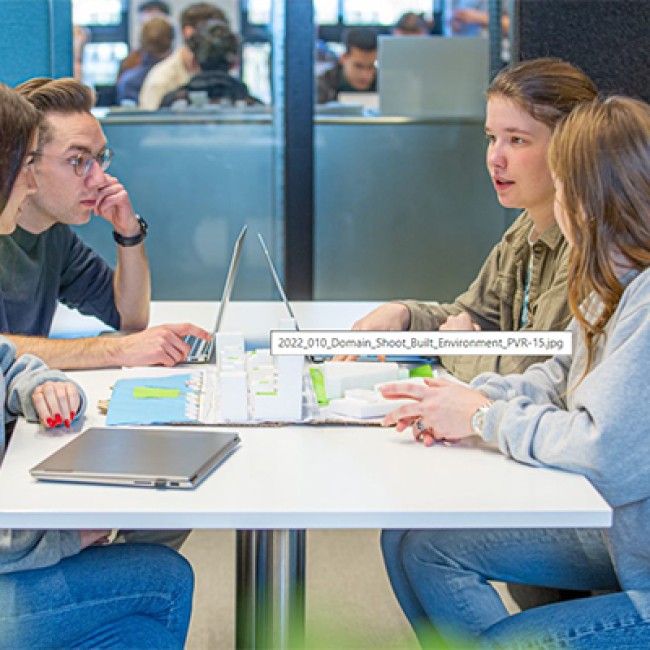
This is life!
Together with fellow students, municipalities, project developers and social organisations, you will work on real-life cases in the field of urban design and mobility.
Admission & application
What are the admission requirements?
To be admitted to this degree programme, you need a havo or vwo diploma with an appropriate profile, or an equivalent of these Dutch diplomas. You can also be admitted with a level-4 mbo diploma.
- Check out the complete admission requirements and the possibilities if you do not meet the requirements
- Additional requirements have been set for the 3-year track.
Information about admission requirements
What does this study programme cost?
In the academic year 2025-2026 the statutory tuition fee for bachelor programmes is €2,601. In addition, you should take extra costs for software, excursions, etc. into account
How can I apply?
If you meet the admission requirements, you can apply for this study programme. If you do so before 1 May, you can certainly start your studies.
More information about applying
Find out if Built Environment suits you
Do you want to know if our professional bachelor's programme Built Environment is the right choice for you?
Within four minutes you will find out if this study programme is the right fit for you!


I can see the potential of an area more clearly

Integral thinking is key

You need to understand people and their context

What can you do after your studies?
As a bachelor of Built Environment you are trained to optimise living environments and to design functions and accessibility of areas or locations on the international market. Career examples are: strategic designer, urban planner and manager of sustainable urban mobility at international companies and organisations. Possible employers are multinationals, government services and consultancy agencies and you will likely be working on urban development challenges in multidisciplinary teams.
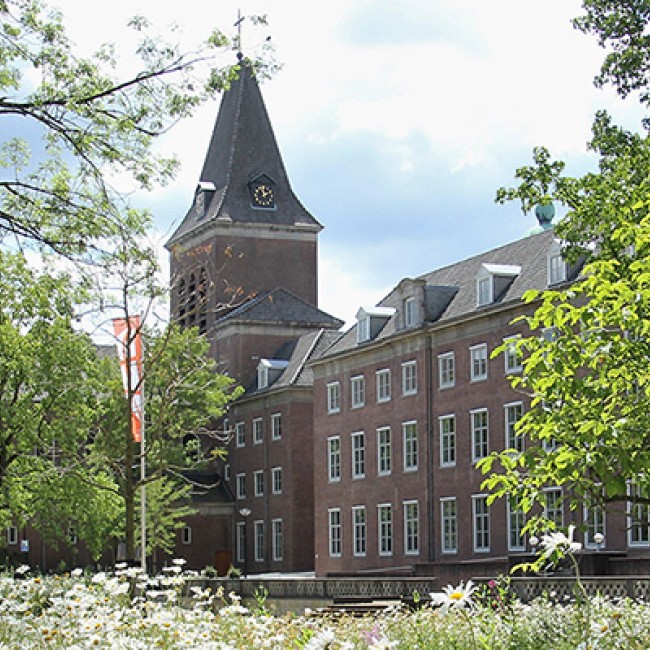
Virtual campus tour
Have a virtual look and discover our campus, the building where you’ll be studying and what more the campus has to offer.
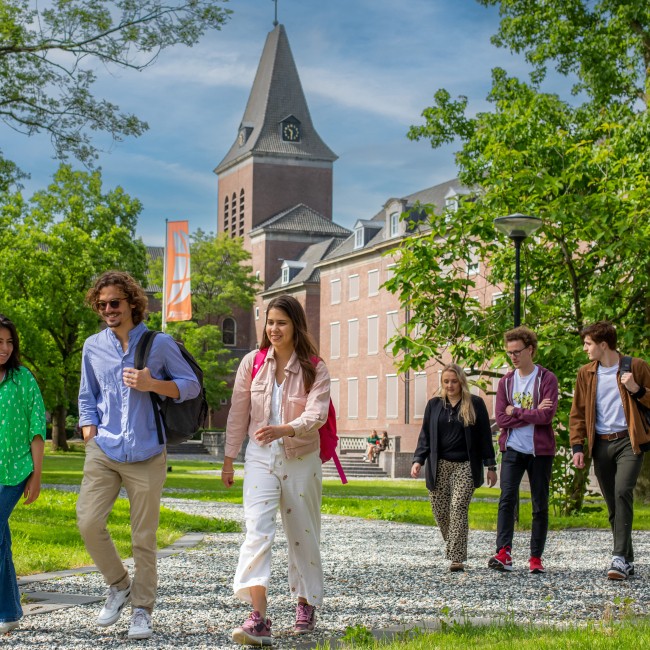
Studying at BUas
What is it like studying at BUas? What does the campus look like and what activities can be undertaken? Is Breda actually a vibrant university town?

Assistance in choosing your study programme
Do you already know exactly what you want to study or do you not have any clue at all? Find out, compare and choose your professional/ academic bachelor’s or master’s programme at BUas.

